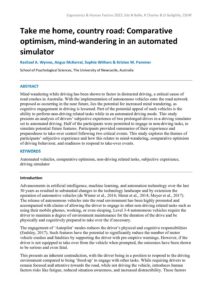| Document | Author Rachael A. Wynne, Angus McKerral, Sophie Withers & Kristen M. Pammer |
| Abstract Mind wandering while driving has been shown to factor in distracted driving, a critical cause of road crashes in Australia. With the implementation of autonomous vehicles onto the road network proposed as occurring in the near future, lies the potential for increased mind wandering, as cognitive engagement in driving is lessened. Part of the potential appeal of such vehicles is the ability to perform non-driving related tasks while in an automated driving mode. This study presents an analysis of drivers’ subjective experience of two prolonged drives in a driving simulator set to automated driving. Half of the participants were permitted to engage in non-driving tasks, to simulate potential future features. Participants provided summaries of their experience and preparedness to take-over control following two critical events. This study explores the themes of participants’ subjective experience and how this relates to mind-wandering, comparative optimism of driving behaviour, and readiness to respond to take-over events. |

